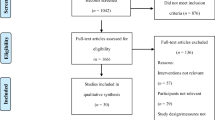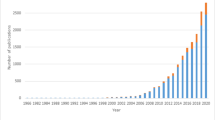Abstract
Purpose
Despite the large clinical interest in mindfulness, little is known about its effects in patients with brain tumours. Novel delivery methods such as App based Mindfulness training (AMT) may assist in the delivery of mindfulness treatment to this group of patients.
Methods
We aimed to determine the feasibility of administering an 8-week mindfulness treatment by AMT in patients operated on for brain tumours in a publically funded hospital. As a secondary aim we collected preliminary data regarding changes in self-reported psychological distress, quality of life and mindfulness capacity.
Results
Uptake was of 40 potentially eligible participants. Of the 20 entering the study, only 10 completed the 8-week post group assessment and only 3 completed the follow-up assessment. There was a positive direction of pre-post change in almost all completers with statistically significant improvement in several mindfulness scales and illness-related quality of life however there was a deterioration in the social/family quality of life domain. The significant variability in individual usage of the AMT appeared to be related more to individual differences rather than tumour histology, progression or treatment. The treatment was well received by those completing the study.
Conclusions
Recruitment and retention feasibility issues were identified. Promising preliminary change and treatment satisfaction scores however suggest that further research with the AMT is warranted. Reduced assessment burden and more regular engagement during treatment is recommended to enhance retention. Large sample sizes however will be needed to address the heterogeneity of this group.


Similar content being viewed by others
Data availability
De-identified data is available from the corresponding author on request.
References
Huang H-P, He M, Wang H-Y, Zhou M (2015) A meta-analysis of the benefits of mindfulness-based stress reduction (MBSR) on psychological function among breast cancer (BC) survivors. Breast Cancer. https://doi.org/10.1007/s12282-015-0604-0
Monti DA, Kash KM, Kunkel EJS et al (2012) Changes in cerebral blood flow and anxiety associated with an 8-week mindfulness programme in women with breast cancer. Stress Health 28:397–407. https://doi.org/10.1002/smi.2470
Richard NM, Bernstein LJ, Mason WP et al (2019) Cognitive rehabilitation for executive dysfunction in brain tumor patients: a pilot randomized controlled trial. J Neuro-Oncol 11:1–11. https://doi.org/10.1007/s11060-019-03130-1
Milbury K, Weathers S-P, Durrani S et al (2020) Online couple-based meditation intervention for patients with primary or metastatic brain tumors and their partners: results of a pilot randomized controlled trial. J Pain Symptom Manag. https://doi.org/10.1016/j.jpainsymman.2020.02.004
Zimmermann FF, Burrell B, Jordan J (2018) The acceptability and potential benefits of mindfulness-based interventions in improving psychological well-being for adults with advanced cancer: a systematic review. Complement Ther Clin Pract 30:68–78. https://doi.org/10.1016/j.ctcp.2017.12.014
van der Donk LJ, Tovote KA, Links TP et al (2019) Reasons for low uptake of a psychological intervention offered to cancer survivors with elevated depressive symptoms. Psychooncology 28:830–838. https://doi.org/10.1002/pon.5029
Mani M, Kavanagh DJ, Hides L, Stoyanov SR (2015) Review and evaluation of mindfulness-based iPhone apps. JMIR Mhealth Uhealth 3:e82. https://doi.org/10.2196/mhealth.4328
Cillessen L, Schellekens MPJ, Van de Ven MOM et al (2018) Consolidation and prediction of long-term treatment effect of group and online mindfulness-based cognitive therapy for distressed cancer patients. Acta Oncol 57:1293–1302. https://doi.org/10.1080/0284186X.2018.1479071
Compen FR, Bisseling EM, Schellekens MP et al (2017) Mindfulness-based cognitive therapy for cancer patients delivered via internet: qualitative study of patient and therapist barriers and facilitators. J Med Internet Res 19:e407. https://doi.org/10.2196/jmir.7783
Zigmond AS, Snaith RP (1983) The hospital anxiety and depression scale. Acta Psychiatr Scand 67:361–370
Bjelland I, Dahl AA, Haug TT, Neckelmann D (2002) The validity of the hospital anxiety and depression scale. An updated literature review. J Psychosom Res 52:69–77. https://doi.org/10.1016/s0022-3999(01)00296-3
Baer RA, Smith GT, Lykins E et al (2008) Construct validity of the five facet mindfulness questionnaire in meditating and nonmeditating samples. Assessment 15:329–342. https://doi.org/10.1177/1073191107313003
Carpenter JK, Conroy K, Gomez AF et al (2019) The relationship between trait mindfulness and affective symptoms: a meta-analysis of the Five Facet Mindfulness Questionnaire (FFMQ). Clin Psychol Rev 74:101785. https://doi.org/10.1016/j.cpr.2019.101785
Cella DF, Tulsky DS, Gray G et al (1993) The Functional Assessment of Cancer Therapy scale: development and validation of the general measure. J Clin Oncol 11:570–579
Thavarajah N, Bedard G, Zhang L et al (2014) Psychometric validation of the functional assessment of cancer therapy–brain (FACT-Br) for assessing quality of life in patients with brain metastases. Support Care Cancer 22:1017–1028. https://doi.org/10.1007/s00520-013-2060-8
Ware J, Kosinski M, Keller SD (1996) A 12-Item Short-Form Health Survey: construction of scales and preliminary tests of reliability and validity. Med Care 34:220–233
Huo T, Guo Y, Shenkman E, Muller K (2018) Assessing the reliability of the short form 12 (SF-12) health survey in adults with mental health conditions: a report from the wellness incentive and navigation (WIN) study. Health Qual Life Outcomes 16:34–38. https://doi.org/10.1186/s12955-018-0858-2
Boele FW, Klein M, Verdonck-de Leeuw IM et al (2018) Internet-based guided self-help for glioma patients with depressive symptoms: a randomized controlled trial. J Neuro-Oncol 137:191–203. https://doi.org/10.1007/s11060-017-2712-5
Breitbart W, Rosenfeld B, Pessin H et al (2015) Meaning-centered group psychotherapy: an effective intervention for improving psychological well-being in patients with advanced cancer. J Clin Oncol 33:749–754. https://doi.org/10.1200/JCO.2014.57.2198
Ludolph P, Kunzler AM, Stoffers-Winterling J et al (2019) Interventions to promote resilience in cancer patients. Dtsch Arztebl Int 51–52:865–872. https://doi.org/10.3238/arztebl.2019.0865
Zimmermann FF, Jordan J, Burrell B (2020) Coping with cancer mindfully_ A feasibility study of a mindfulness intervention focused on acceptance and meaning in life for adults with advanced cancer. Eur J Oncol Nurs 44:101715. https://doi.org/10.1016/j.ejon.2019.101715
Lindsay EK, Creswell JD (2017) Mechanisms of mindfulness training: monitor and acceptance theory (MAT). Clin Psychol Rev 51:48–59. https://doi.org/10.1016/j.cpr.2016.10.011
Reynolds LM, Bissett IP, Porter D, Consedine NS (2017) A brief mindfulness intervention is associated with negative outcomes in a randomised controlled trial among chemotherapy patients. Mindfulness 8:1291–1303
Carmody J, Baer RA (2009) How long does a mindfulness-based stress reduction program need to be? A review of class contact hours and effect sizes for psychological distress. J Clin Psychol 65:627–638. https://doi.org/10.1002/jclp.20555
Jain S, Shapiro SL, Swanick S et al (2007) A randomized controlled trial of mindfulness meditation versus relaxation training: effects on distress, positive states of mind, rumination, and distraction. Ann Behav Med 33:11–21. https://doi.org/10.1207/s15324796abm3301_2
Costa DS, Mercieca-Bebber R, Rutherford C et al (2016) The impact of cancer on psychological and social outcomes. Aust Psychol 51:89–99. https://doi.org/10.1111/ap.12165
Ndetei D, Musyimi C, Tele A et al (2018) Psychological well-being and social functioning across the cancer stages: implications for palliative care. J Soc Work End Life Palliat Care 14:194–208. https://doi.org/10.1080/15524256.2018.1472718
Cubis L, Ownsworth T, Pinkham MB, Chambers S (2018) The social trajectory of brain tumor: a qualitative metasynthesis. Disabil Rehabil 40:1857–1869. https://doi.org/10.1080/09638288.2017.1315183
Hottinger AF, Homicsko K, Negretti L et al (2012) Decision making and management of gliomas: practical considerations. Ann Oncol 23(Suppl_10):x33–x40. https://doi.org/10.1093/annonc/mds302
Ricard D, Idbaih A, Ducray F et al (2012) Primary brain tumours in adults. Lancet 379:1984–1996. https://doi.org/10.1016/S0140-6736(11)61346-9
Theeler BJ, Gilbert MR (2015) Advances in the treatment of newly diagnosed glioblastoma. BMC Med 13:293. https://doi.org/10.1186/s12916-015-0536-8
Dirven L, Aaronson NK, Heimans JJ, Taphoorn MJB (2014) Health-related quality of life in high-grade glioma patients. Chin J Cancer 33:40–45. https://doi.org/10.5732/cjc.013.10214
Acknowledgements
We thank Headspace for support for this research project as noted above. We thank the staff at the Neurosurgery department for the support with this project and continuous patients’ care.
Funding
No financial disclosures to declare.
Author information
Authors and Affiliations
Corresponding author
Ethics declarations
Conflict of interest
Headspace® provided free access to 1-year subscriptions for patients in this trial and provided de-identified usage data to the researchers on request. Headspace® had no input into the design or conduct of the study or in the writing of this manuscript.
Consent to participate
All participants provided written informed consent to participate in the study and for release of usage data from Headspace®.
Consent for publication
Participants consented to publication of de-identified data.
Ethical approval
The study received ethics approval: Health and Disability Ethics Committees 16NTB183.
Additional information
Publisher’s Note
Springer Nature remains neutral with regard to jurisdictional claims in published maps and institutional affiliations.
Rights and permissions
About this article
Cite this article
De Tommasi, C., Richardson, E., Reale, M. et al. Evaluation of a novel application of a mindfulness phone application for patients with brain tumours: a feasibility study. J Neurooncol 149, 489–498 (2020). https://doi.org/10.1007/s11060-020-03638-x
Received:
Accepted:
Published:
Issue Date:
DOI: https://doi.org/10.1007/s11060-020-03638-x




